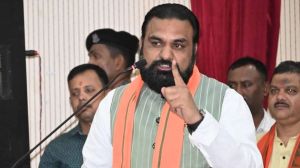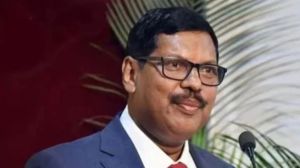Admn reforms panel calls for abolition of octroi
The Second Administrative Reforms Commission has recommended abolition of octroi.

The Second Administrative Reforms Commission (ARC) has recommended abolition of octroi. But it has suggested that the government should evolve mechanisms “to compensate local government for the loss of revenue”.
The report on local governance has also called for a State Finance Commission that would carry forward the recommendations of the Central Finance Commission. Objective norms should be evolved and an Action Taken Report on the commission’s recommendations should be placed in the state Assembly, the report has suggested.
Another suggestion put forward by the Commission is the setting-up of a third-tier of democratic government at the district level in the form of a district council. Calling for replacement of the existing “colonial legacy”, the commission headed by M Veerappa Moily today suggested that the district collector should work as the “chief secretary” of this council.
In an attempt to take forward the constitutional amendments on Panchayati Raj, the commission has also recommended formation of Legislative Councils with members elected by the local bodies. This would strengthen the “voice of local bodies”, the commission said in its report on local governance released here today.
The commission has advocated a simplified property tax regime based on the “unit area method” or “capital value method”. This would take into account the market value of the property being assessed for tax.
It has suggested increase in fines for civic offences and amendments to existing laws to empower municipal authorities with powers to impose fines for such violations.
The ARC report has called for creation of a Unified Metropolitan Transport Authority (UMTA) in all cities with a population in excess of a million. The commission has also suggested that the Centre and state governments should aim at developing at least “25-30 world-class cities” by utilising the Jawaharlal Nehru Urban Renewal Mission (JNURM). Slum development and skill development have been cited as means to include the urban poor in the development process.
The commission has called for a National Commission of Urbanisation to suggest steps to deal with rapid urbanisation. It has recommended that the mayor of urban local bodies should be elected directly by the people. The mayor should serve as the “chief executive” of the municipal body and be assisted by a “mayor’s Cabinet” from among elected corporators.
Bodies such as electricity boards and water authorities should be made responsible to local bodies for their services, the Commission has said. All service providers in cities should be brought under one umbrella by establishing “one-stop centres” within two years. Modern technology should be used by all local bodies to bring about transparency and accountability.
Panel’s proposals
•State Finance Commission to carry forward recommendations of the Central Finance Commission; Action Taken Report in the state Assembly
•A third-tier of democratic government at the district level in the form of a district council; district collector to work as “chief secretary” of the council
•Legislative Councils with members elected by local bodies
•Simplified property tax regime based on the “unit area method” or “capital value method”



- 01
- 02
- 03
- 04
- 05




























